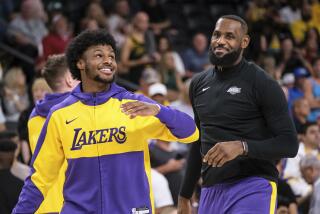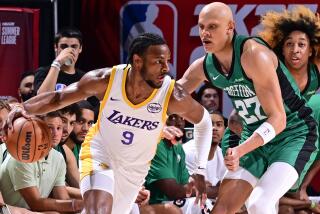Brandon Jennings hopes his European adventure pays off
Somewhere out there on the otherworldly Los Angeles freeways, maybe even at this very moment, steers a driver of uncommon skill.
She has gone to the driving stratosphere and returned. She has demonstrated a deftness and bravery exceeding that of mortals and most Americans. She has just spent the bygone fall and winter and spring navigating R-R-R-Rome.
It does wreak a shudder.
As the indispensable cog in a pioneering sports experiment -- her son’s year in European professional basketball between high school and the NBA draft -- Alice Knox, Claremont High Class of ‘79, can give rare tutelage.
Day in, day out, she drove 19-year-old basketball prodigy Brandon Jennings to games and practices amid some of the world’s most fearlessly insouciant drivers and absurdly concocted intersections.
“You just have to go with the flow, drive like them, and don’t be scared,” she wrote in an e-mail. Rush to any open spot. Flinch not at 90-100-mph fast lanes. “In the beginning I was very scared to drive, but I went for it, and now I can drive anywhere without the navigation system.”
In returning to Los Angeles, she wrote, “I have to deprogram myself.”
She spoke in May just after her son’s last regular-season game and just before reaching for the keys again in the hallway of PalaLottomatica, the arena in southern Rome. She spoke after a season of stresses such as expatriate displacement and strains such as Jennings’ unpredictable playing time. She spoke while standing next to a visibly exhilarated 185-centimeter (that’s 6-feet-2) “G/P” -- guard/playmaker, in local parlance -- who’d weathered a grind and materialized in the top 10s of many of the too-numerous-to-count NBA mock drafts.
“I think this was the best decision I made so far in my life,” said Jennings, who played at Compton Dominguez High and then Mouth of Wilson (Va.) Oak Hill Academy and was rated among the nation’s top prep point guards a year ago. “Even though I’m not playing a lot and my numbers don’t show that I’m doing a lot, I took on a challenge . . . and I did it.”
He added, “The driving is crazy! They park their cars everywhere, and there’s no lines in the streets. They’re very impatient.”
Pioneers do hit the first potholes, however esoteric the pioneering.
It had been a challenging year since Jennings and Knox heard the famed basketball businessman Sonny Vaccaro on the radio espousing a creative deviation to the NBA’s three-year-old rule requiring high school seniors to wait a year before entering the draft. Vaccaro reckoned that some prep sensation ought to make some money overseas against professionals, and Jennings had dialed up Vaccaro and wound up doing so, signing with Lottomatica Roma for $1.2 million.
There had been the dregs of the middle of November, from which Jennings recalls being exhausted on his bed in a nadir. “I was just mentally, ‘I can’t do this much more,’ ” he said. And, “I got a little homesick. For everything, for being around my friends. I wasn’t playing as much. The American lifestyle. Food. It was a lot of things all built up.”
There had been the pining of March, which is recalled as a rough patch. “You know when it was tough for him?” said Kris Stone, who, as an executive for Under Armour, the apparel company that endorses Jennings, had “a lot of, lot of, lot of” phone conversations with him. “When he started to see his buddies in the NCAA tournament” -- Kemba Walker, Tyreke Evans -- “and a lot of these kids were playing on ESPN and he’s seeing them and it was almost like Brandon was being forgotten.”
There had been the snags of foreign life, trivial matters that can pile up, things Americans don’t ponder when they envy those on grand adventures. As Stone put it, “It’s an adjustment to not have a dryer.”
It’s not a plague, but it’s one blip, and the blips add up and, Stone said, “wear on you after a while” and you have to “adjust or go back home.”
There was no road map for how to do this, and then this thing about playing time -- which you may have heard can concern wildly talented, diligent young males from time to time. “He wasn’t used to not playing and he wasn’t used to not playing 25 or 30 minutes a night,” Stone said. “Just a huge shock.”
Stone extolled Knox and said, “If it wasn’t for Alice, you know, who knows?”
As Lottomatica Roma finished a 20-10, second-place season -- it would lose in the playoff quarterfinals -- its coach, Nando Gentile, finished a news conference in a spartan, classroom-style setting, then said of Jennings in English, “For me, he’s one of the best talents in Europe.” And: “For me, he’s very young for this [league]. He needs more years in this [league].”
Jennings played 27 of 30 league games, averaging 2.3 assists, 5.1 points. More significantly, as all else faded and the spring swept in, he had begun to feel the elation of having seen something through.
By the final game, the setting told the unusualness of his path. He played in a round, nondescript arena with fairly barren premises, a trailer concession stand across the street, a small bust of the great Italian motorcycle and car racer Tazio Nuvolari just outside the gates.
He warmed up his left-handed, high-arc shots to Estelle’s “American Boy” at one point (“Take me to New York/I’d like to see L.A. . . .”). His teammates included five Italians, two Slovenians, one Spaniard, one Bulgarian and two other Americans -- Michigan State product Andre Hutson and Ruben Douglas, who played at Burbank Bell-Jeff High and in college for Arizona and New Mexico.
Jennings wore a jersey festooned with ads. The banners overhead included the 1982-83 “Scudetto,” the 1984 “Coppa Champion,” the 2000 “Supercoppa.”
From a crowd just shy of half full, audible comments came in an indiscernible -- if gorgeous -- language. Alice cheered from the top of the lower deck, midcourt, wearing a white blouse and headband as her son played 26 minutes with eight points and seven assists and a few plays that shimmered with talent and dazzled the audience.
Online, Jennings had a blog post brimming with pride at having shown some visitors around Rome the previous week. He had contributed $50,000 to the earthquake victims of L’Aquila, Italy.
When the game ended, he joined his teammates applauding the fans, and when he bounded down the steps afterward, he sounded older than 19.
“How is this helping me down the road?” he said. “What happens if I don’t play next year in the NBA? I’m used to it. I know you’ve just got to keep grinding.” He had played “against men every day.”
He was almost home, and many of those mock drafts had him going eighth to the New York Knicks or seventh to the Golden State Warriors or fourth to the Sacramento Kings.
As NBA Commissioner David Stern put it, “I don’t want to speak against the colleges, but I will say if you’re going to go professional in anything, you practice, practice, practice. They spend a lot of time practicing in Europe. As I’ve said about Brandon Jennings, it helps us to see him against better players.”
And then, as a telling byproduct to this bit of trailblazing, the L.A. woman who made it work returned as well -- just after an e-mail with a smiley face in which Alice Knox wrote, “I will be the queen of the 405.”
--
More to Read
Go beyond the scoreboard
Get the latest on L.A.'s teams in the daily Sports Report newsletter.
You may occasionally receive promotional content from the Los Angeles Times.










